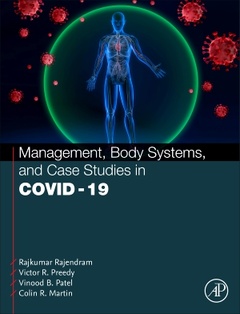Management, Body Systems, and Case Studies in COVID-19
Coordonnateurs : Rajendram Rajkumar, Preedy Victor R, Patel Vinood, R Martin Colin

Section A: Introductory chapters and setting the scene
1. Hand hygiene strategies
2. Approved vaccines for the COVID-19 pandemic: Linking in future perspectives
3. Molecular methods for SARS-CoV-2 variant detection
Section B: Management
4. Systematic patient assessment for acute respiratory tract ailments (SPARTA): A simple tool to improve outcomes from COVID-19
5. Point of care ultrasound for coronavirus disease 2019: The multiorgan approach to COVID-19
6. COVID-19 in patients with inflammatory bowel diseases: Features and guidelines
7. Management of COVID-19 and clinical nutrition
8. The management of head and neck cancer in COVID-19
9. The COVID-19 pandemic: Inventory management and allocation of personal protective
equipment
10. Clinical management in the COVID-19 pandemic: Rheumatic disease
11. Managing migraines during the COVID-19 pandemic: An Italian experience
12. Managing acute ischemic stroke in the SARS-CoV-2 pandemic
13. Impact of the coronavirus disease 2019 pandemic on patients with hypertension
14. Neurosurgical trauma management during COVID-19 restrictions
15. The COVID-19 pandemic and management of weight gain: Implications for obesity
16. COVID-19 and the management of heart failure using telemedicine
Section C: Guidelines for different treatment clinics
17. Guidelines for breast imaging in the COVID-19 pandemic
18. Vaccine-induced (immune) thrombotic thrombocytopenia (VITT): Diagnosis, guidelines,
and reporting
19. Lung cancer in the era of COVID-19
20. Multisystem inflammatory syndrome in children/pediatric inflammatory multisystem
syndrome: Clinical guidelines
Section D: Impact on the respiratory system
21. Ground-glass nodules in the lungs of COVID-19 patients
22. Cardiothoracic imaging in patients affected by COVID-19
23. Cystic fibrosis and bronchial epithelial cells in SARS-CoV-2 infection
24. Biomechanics and mechanobiology of the lung parenchyma following SARS-CoV-2 infection
25. Long noncoding RNA profiling in respiratory specimens from COVID-19 patients
26. COVID-19 and acute pulmonary embolism
27. The usefulness of the alveolar-arteriolar gradient during the COVID-19 pandemic
Section E: Effects on cardiovascular and hematological systems
28. Cardiac manifestations of COVID-19: An overview
29. Limb ischemia and COVID-19
30. Thrombosis and coagulopathy in COVID-19: A new narrative
31. COVID-19 myocarditis: Features of echocardiography
32. COVID-19 lockdown and impact on arrhythmias
33. Cardiometabolic disease and COVID-19: A new narrative
34. Postrecovery COVID-19 and interlinking diabetes and cardiovascular events
35. COVID-19 patients and extracorporeal membrane oxygenation
36. Sars-CoV-2 infection in different hematological patients
Section F: Effects on body systems
37. Dermatological reactions associated with personal protective equipment use during
the COVID-19 pandemic
38. Hemodialysis patients, effects of infections by SARS-CoV-2 and vaccine response
39. Coinfections with COVID-19: A focus on tuberculosis (TB)
40. Patients with autoimmune liver disease and the impact of Sars-COV-2 infection
41. COVID-19 severity and nonalcoholic fatty liver disease
42. Changes in obesity and diabetes severity during the COVID-19 pandemic at Virginia
Commonwealth University health system
43. The diabetic patient and concomitant conditions rhinoorbital-cerebral mucormycosis
and COVID-19
44. Tissue location of SARS-CoV-2 RNA: A focus on bone and implications for skeletal health
45. Linking between gastrointestinal tract effects of COVID-19 and tryptophan metabolism
46. Organ damage in SARS-CoV-2 infection in children: A focus on acute kidney injury
47. Obesity, COVID-19 severity, and mortality
48. Upper and lower gastrointestinal symptoms and manifestations of COVID-19
49. The COVID-19 survivors: Impact on skeletal muscle strength
Section G: Case studies with mini review
50. A case report: COVID-19 meningoencephalitis and intracranial hemorrhage
51. Case study: Oral mucosal lesions in patients with COVID-19
52. Case study: COVID-19 pneumonia presented with cavitary lesions
53. Case study: Optic neuritis in SARS-CoV-2 infection
Section H: Resources
54. Recommended resources relevant to the body systems involvement
and management of COVID-19
Dr Rajkumar Rajendram is a clinician scientist with a focus on internal medicine, anaesthesia, intensive care and peri-operative medicine. He graduated with distinctions from Guy’s, King’s and St. Thomas Medical School, King’s College London in 2001. As an undergraduate he was awarded several prizes, merits and distinctions in pre-clinical and clinical subjects.
Dr Rajendram began his post-graduate medical training in general medicine and intensive care in Oxford. He attained membership of the Royal College of Physicians (MRCP) in 2004 and completed specialist training in acute and general medicine in Oxford in 2010. Dr Rajendram subsequently practiced as a Consultant in Acute General Medicine at the John Radcliffe Hospital, Oxford.
Dr Rajendram also trained in anaesthesia and intensive care in London and was awarded a fellowship of the Royal College of Anaesthetists (FRCA) in 2009. He completed advanced training in regional anaesthesia and intensive care. He was awarded a fellowship of the Faculty of Intensive Care Medicine (FFICM) in 2013 and obtained the European diploma of intensive care medicine (EDIC) in 2014. He then moved to the Royal Free London Hospitals as a Consultant in Intensive Care, Anaesthesia and Peri-operative Medicine. He has been a fellow of the Royal College of Physicians of Edinburgh (FRCP Edin) and the Royal College of Physicians of London (FRCP Lond) since 2017 and 2019 respectively. He is currently a Consultant in Internal Medicine at King Abdulaziz Medical City, National Guard Heath Affairs, Riyadh, Saudi Arabia.
Dr Rajendram’s focus on improving outcomes from Coronavirus Disease 2019 (COVID-19) has involved research on point of care ultrasound and phenotypes of COVID-19. Dr Rajendram also recognises that nutritional support is a fundamental aspect of medical care. This is particularly important for patients with COVID-19. As a clinician scientist he has therefore devoted significant time and effort into nutritional
- Discusses the management of multisystem symptomatology, including the effects of COVID-19 on the neurological, respiratory, hematological, hepatobiliary, gastrointestinal, and cardiovascular systems
- Includes select guidelines for clinics providing care for COVID-19 patients
- Features individual chapter introductions, and a section on case studies to provide a comprehensive primer for each topic
- Contains chapters with key facts, dictionary of terms, summary points, applications to other areas pertinent to each chapter, and policies and procedures
Date de parution : 06-2024
Ouvrage de 622 p.
21.5x27.6 cm
À paraître



